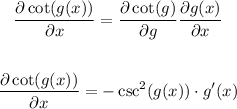To solve the present problem, we will be using some derivation properties such as chain rule
By the chain rule, we know that:

The derivative of G in respect to x, we can call it G'(x), because the G(x) is not given. From this, we are able to develop the given function derivative as follows:

From the solution developed above we are able to conclude that the solution of the present question is:
B. - csc²(g(x))*g'(x)